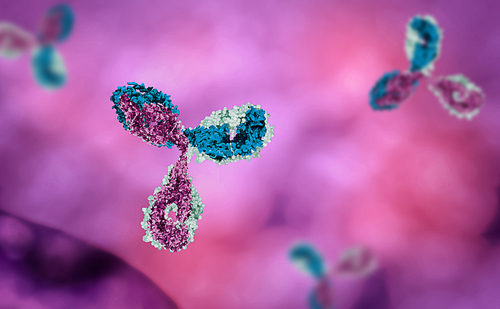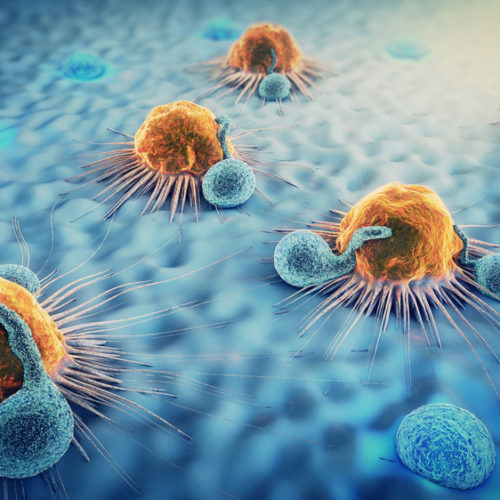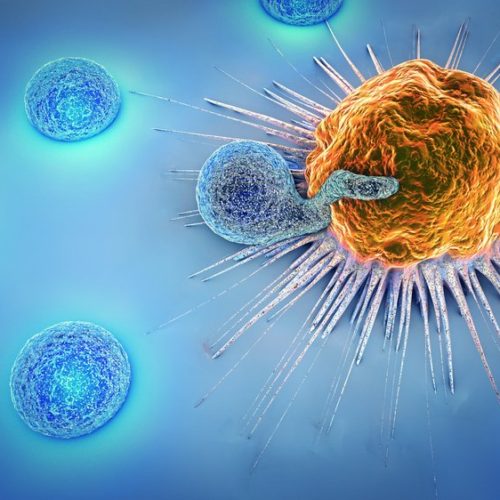This post was originally published on this site Breast cancer surgery with negative or clear margins, which leaves no signs of cancer behind, stimulates a protective anticancer immune response that reduces the risk of cancer spread to other regions in the body, a mouse study suggests. Researchers are now studying if the molecular culprits involved in…
Author: Chris
Researchers Create Human-like Antibody for Treatment of Alzheimer’s, PSP
This post was originally published on this site Tau bio-logic and LifeArc researchers have generated a human-like antibody called TBL-100 for the treatment of Alzheimer’s disease (AD) and progressive supranuclear palsy (PSP). An antibody is a large Y-shaped protein that’s naturally produced in response to invading foreign particles (antigens) such as viruses. A humanized antibody refers…
Radiation, Hormone Therapy Extend Survival in Advanced PC, Phase 3 Trial Shows
This post was originally published on this site A combination of androgen deprivation therapy (ADT) and external beam radiation therapy (EBRT) is better at delaying disease progression and extending survival of patients with locally advanced prostate cancer than ADT alone, a Phase 3 trial shows. The study, “Long‐term androgen deprivation, with or without radiotherapy, in…
Aprea’s APR-246 Stabilizes Key Tumor Suppressor Protein and Boosts Immune Responses in Mouse Study
This post was originally published on this site Aprea Therapeutics‘ APR-246 stabilizes the tumor suppressor protein p53, boosting responses to checkpoint blockade immunotherapies in mouse models of melanoma and colorectal cancer, a study says. Findings were announced in a press release and featured on the poster, “TP53-stabilization with APR-246 enhances antitumor effects of immune checkpoint blockade…
Liposomal Irinotecan Shows Promising Phase 1 Results in Heavily Treated Breast Cancer Patients
This post was originally published on this site Treatment with a liposomal formulation of irinotecan — meaning the chemotherapy is wrapped up in tiny fatty spheres —was well-tolerated and partially reduced the tumor burden in 35% of heavily pretreated breast cancer patients in a Phase 1 clinical trial, including those with brain metastasis. Results were…
New Model of Blood-Brain Barrier May Aid in Predicting Therapies Able to Best Treat Patients, Scientists Say
This post was originally published on this site A cellular model that simulates the blood-brain barrier — a membrane that protects against viruses or other insults entering through the blood stream — may help in understanding how potential treatments for neurological diseases like Alzheimer’s could better cross that barrier to reach the brain and central nervous system,…
Surgeons Will Test LUM Imaging System to Better Detect Ovarian, Other Cancer Cells
This post was originally published on this site Lumicell is assessing its LUM Imaging System as a means to help surgeons better detect cancer cells that spread into the peritoneum — the membrane lining the abdominal cavity and covering the abdominal organs – during surgery, the company announced. The clinical trial (NCT03834272) — which is…
MMRF Launches Fund to Invest in Innovative Firms for Multiple Myeloma Research
This post was originally published on this site The Multiple Myeloma Research Foundation (MMRF) has launched the Myeloma Investment Fund in an effort to attract promising biotech and technology companies to the multiple myeloma field and to advance new treatments. The $50 million independent, self-sustaining fund is focused on accelerating the foundation’s mission to deliver precision…
Epstein-Barr Vaccination Could Cut Risk of B-cell Lymphoma, Study Suggests
This post was originally published on this site Chronic B-cell activation — which can happen because of infectious mononucleosis, commonly caused by the Epstein-Barr virus (EBV) — triggers an excessive proliferation of certain B cells, which can evolve into a B-cell lymphoma. Although such chronic activation alone is not sufficient to drive cancer onset, vaccinating against EBV may work to…
Melanomas with NF-kB Activation Are Easier to Target with Immune Checkpoint Inhibitors, Study Says
This post was originally published on this site Melanomas with a high number of genetic mutations that lead to over-activation of the nuclear factor-κB (NF-κB) signaling cascade — a family of gene expression regulators — are about three times more likely to respond to treatment with checkpoint blockade immunotherapies, according to a study. The findings…











